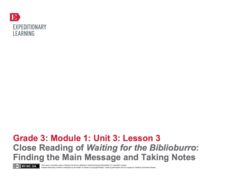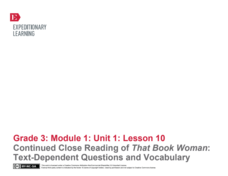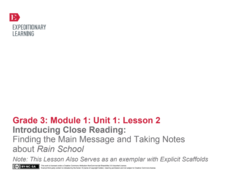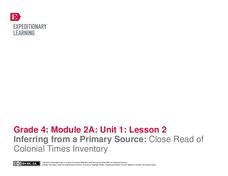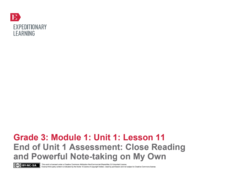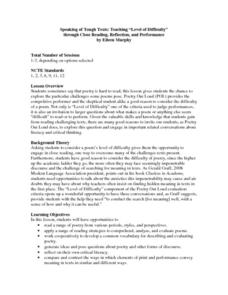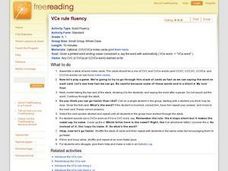EngageNY
Close Reading of Waiting for the Biblioburro: Finding the Main Message and Taking Notes
Expose your class to Waiting for the Biblioburro, narrative nonfiction that will act as the bridge between ficiton and informational texts to come. Class members do a close reading of the text, looking at excerpts instead of the whole...
EngageNY
Continued Close Reading of That Book Woman: Text-Dependent Questions and Vocabulary
Explicitly explained and delightfully detailed are two ways to describe this tenth lesson plan in a larger unit designed for the first few weeks of third grade. Learners continue to use and develop previously learned close reading...
EngageNY
Introducing Close Reading: Finding the Main Message and Taking Notes About Rain School
This second lesson in a larger unit is perfect for the beginning of the year because it explicitly teaches 3rd graders how to use close reading skills by identifying unfamiliar words, figuring out the gist, and defining important...
EngageNY
Continued Close Reading of Rain School: Text-Dependent Questions and Vocabulary
The engaging story Rain School is further explored in the third lesson of a larger unit that explicitly teaches close reading skills by answering questions whose answers can only be found inside the text. Through teacher modeling and...
EngageNY
Close Reading of That Book Woman: How Did People Access Books in Rural Areas of the United States?
For this ninth lesson plan in a larger beginning-of-the-year unit, close reading skills are used independently to find the gist of the story That Book Woman. Rereading for important details is the targeted skill to unlock a deeper...
Heritage Foundation
How to Read the Constitution
Even lawyers can find the US Constitution to be very wordy! Help learners create a foundation for understanding the Constitution with several analysis essays. Multiple activities complement the reading and allow for active and meaningful...
EngageNY
Reading Maps: Locating the Countries We Have Been Reading About
Show your class how to read a map and decipher all of the markings and features. Start out by connecting maps to their homework from the night before and their current reading, in this case That Book Woman, and a related informational...
Curated OER
Left-to-Right Reading
Left-to-right, left-to-right, that's the way we read and write! Watch this short video clip and teach your young learners this chant before they start writing!
Curated OER
Bud, Not Buddy: Directed Reading Thinking Activity
Here’s a reading strategy that can be used with any text. Class members examine portions of a novel, and make predictions about the theme or subject matter of the book. Although designed for Christopher Paul Curtis’s Newbery Medal...
Curated OER
Teaching Reading Comprehension through Social Studies Readings
Examine how immigrants have changed the environment of the United States. Individually, middle schoolers will take a pre- and post-test to assess their reading comprehension. In groups, they compare and contrast the religions of...
EngageNY
Close Reading of Nasreen's Secret School: How Do People Access Books in Afghanistan?
Third graders continue to practice the close reading skills of capturing the gist and reading again for important details in the sixth lesson in a larger unit. This is a great beginning-of-the-year unit for establishing visible thinking...
EngageNY
Inferring from a Primary Source: Close Read of Colonial Times Inventory
Teach your class about colonial America through an examination of primary documents. First though, start vocabulary notebooks for content-specific and academic vocabulary. Pupils can keep this record during the entire module. Once this...
EngageNY
Informative Paragraph Pre-Assessment: What Is One Reason You Want the Power of Reading?
This writing pre-assessment has minimal instruction but maximum support and encouragement. It begins with a review of the book, Rain School, through a think-pair-share and small group discussion. The discussion focuses on the idea that...
EngageNY
End of Unit 1 Assessment: Close Reading and Powerful Note-Taking on My Own
As the final lesson plan in a larger beginning-of-the-year unit to establish routines and teach close reading skills, this plan is designed as an assessment piece. Using the story, The Librarian of Basra, learners independently complete...
Curated OER
Purposes of Reading Fiction and Nonfiction
How does the purpose of a fiction book differ from the purpose on a non-fiction text? Model for your young readers a scenario in which each kind of book might be useful or fun to read and show examples of each genre. A list of suggested...
Curated OER
Teaching “Level of Difficulty” through Close Reading, Reflection, and Performance
What makes a poem difficult? Explore that topic and more with your class as you work through the lesson detailed here. Using materials from Poetry Out Loud, a national recitation contest, individuals or small groups examine poems and...
Annenberg Foundation
Reading Maps
Can you read a map? Scholars use an interactive technology tool to analyze maps of various kinds to gather evidence and data to better understand their meanings and usefulness. Using newly obtained knowledge, they form an interpretation...
Curated OER
VCe Rule Fluency
Explore English by identifying word structures. Learners find many words that end with a vowel, consonant, and then an e. The class will participate in a word flash card game in which they correctly pronounce vowel-consonant words.
Curated OER
Using Initial Sounds and Picture Clues to Read Unknown Words
Kindergarteners read the bold words that are unknown by using the strategies of initial sound and picture clues. They meet individually with their teacher in order to assess this concept. Excellent resource!
Curated OER
What Do You See at the Pond?
With What Do You See at the Pond?, young readers explore pond life and practice reading strategies. Learners first make predictions and then read the simple story independently. After a second read-through with a partner, kids come...
Florida Center for Reading Research
Word Steps
Blending basic CVC letters to make words is one of the first steps to independent reading. Provided here are several images of stairs and several letters to cut and arrange. The learner rearranges the letters to form CVC patterns, sounds...
Curated OER
Caves
Explore caves with your class! Your scholars will participate in scientific observation, research, inference and deduction, reading, vocabulary, and writing activities about caves with this lesson plan. This resource contains five...
Curated OER
Answering Carnival Questions with the Scientific Method
Through the use of a Reading Rainbow episode, clever in-class games and activities, and an ITV Series video, second and third graders engage in a study of the scientific method; what it is, and how scientists use it. This well-designed...
Curated OER
Guided Reading: Three Little Pigs (Plus Wolf: Javalinas)
Guide your class through reading various versions of The Three Little Pigs. Talk about the traditional story line and then discuss a different point of view: Maybe the wolf was just an innocent bystander! This lesson plan, which has...
Other popular searches
- Reading Comprehension
- Fluency
- Guided Reading
- Reading Fluency
- Reading Fluency Passages
- Reading Strategies
- Shared Reading
- Reading Fluency Games
- Choral Reading
- Guided Reading Comprehension
- Reading Comprehension Skills
- Map Reading


